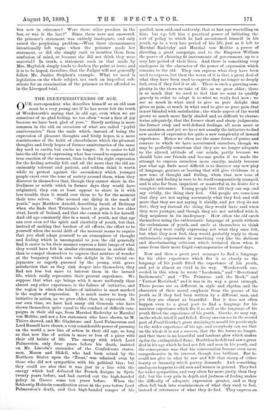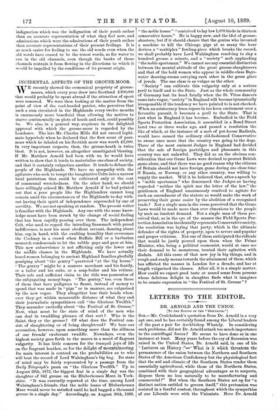THE IN - EXPRESSIVENESS OF AGE.
OUR correspondent who describes himself as an old man must be a very young one if he has never felt the truth of Wordsworth's saying that in old age, even when we are conscious of no glad feeling, we too often "wear a face of joy because we have been glad of yore." Surely nothing is more common in the old, on occasions of what are called "joyful anniversaries," than the smile which, instead of being the expression of pleasant thoughts and lively hopes, is a mere reminiscence of the habit of cheerfulness which the pleasant thoughts and lively hopes of former anniversaries of the same day used to excite, but excite no longer. It is easier to fall into the old way of expressing what has ceased to represent the true emotion of the moment, than to find the right expression for the fedi g actually felt, and all the more that the old are eminently tolerant and patient, and seldom think it worth while to protest against the ascendency which younger people exert over the tone of society around them, when they discover in themselves that, though they cannot share in the liveliness or mirth which in former days they would have originated, they can at least appear to share in it with less trouble than it would cost them to be for the moment their true selves. "She seemed one dying in the mask of youth," says Matthew Arnold, describing Iseult of Brittany when she finds that Tristram's heart is given to her elder rival, Iseult of Ireland, and that she cannot win it for herself. And old age constantly dies in a mask of youth, not that age can ever even act the spirit and elasticity of youth, but that, instead of making that hardest of all efforts, the effort to be yourself when the social drift of the moment seems to require that you shall adapt yourself to an atmosphere of thought and feeling which is uncongenial to you, the old generally find it easier to let their manner express a faint image of what they would have felt in similar circumstances in earlier life, than to compel themselves to express that mixture of wonder at the buoyancy which can take delight in the trivial en- joyments so eagerly pursued by the young, with grave satisfaction that as they sink deeper into themselves, they find not less but more to interest them in the inward life, which really represents their present experience. We suppose that what age brings with it more uniformly than almost any other experience, is the failure of initiative, and the region in which the failure of initiative is most marked is the region of expression. It is much easier to keep the initiative in action, as we grow older, than in expression. In our own time, we have had many old Generals who have shown themselves quite equal to the conduct of difficult cam- paigns in their old age, from Marshal Radetzky to Marshal von Moltke, and not a few statesmen who have shown, us M. Thiers showed, and Mr. Gladstone and Lord Palmerston and Lord Russell have shown, a very considerable power of pressing on the world a new line of action in their old age, so long as that new line of action is more or less of a piece with their old habits of life. The energy with which Lord Palmerston, only four years before his death, insisted on Mr. Lincoln's surrender of the Confederate states- men, Mason and Slidell, who had been seized by the Northern States upon the ' Trent,' was admired even by those who did not sympathise with his political bias ; but they could see also that it was just in a line with the energy which had defeated the French designs in Syria twenty years before, and had carried out the high-handed policy in Greece some ten years before. When the Schleswig-Holstein complication arose in the year before Lord Palmerston's death, and that high-handed temper of his
quailed, men said, and said truly, that at last age was telling on him ; but age left him a practical power of initiating the sort of policy to which he had accustomed himself in his youth, up to a very late period of his life, just as it left to Marshal Radetzky and Marshal von Moltke a power of directing a great campaign, and to the Emperor William the power of choosing fit instruments of government, up to a very late period of their lives. And there is something very analogous in the character of the power of expression which remains to the old. They can express what they have been used to express, but then the worst of it is that a great deal of what they have been used to express they no longer so deeply feel, even if they feel it. at all. There is such a growing com- plexity in the views we take of life as we grow older ; there is so much that we used to feel that we want to qualify gravely in order to adapt it to what we really feel now ; we see so much in what used to give us pure delight that gives us pain, so much in what used to give us pure pain that is now blended with satisfaction ; the whole aspect of the world grows so much more finely shaded and so difficult to charac- terise adequately, that the former short and sharp judgments, the former crisp and well-defined feelings, all seem more or less mistaken, and yet we have not usually the initiative to find new modes of expression for quite a new complexity of inward experience. Hence we often use the same forms of praise and censure to which we have accustomed ourselves, though we may be perfectly conscious that they are no longer adequate to the altered attitude of our minds, partly because we should bore our friends and become prolix if we made the attempt to express ourselves more exactly, mainly because just what age finds most difficult is to discover any new play of language, gesture, or bearing that will give vividness to a new tone of thought and feeling, when that new tone of thought and feeling is sure to be itself comparatively tranquil, and is also far from impatient or masterful in its desire for a complete utterance. Young people fret till they can say, and say vividly, the thing they feel. Old people are conscious that they are not saying accurately what they feel, and still more that they are not saying it vividly, and yet they do not fret; they say instead the thing they would have said when they were younger, and though they are not satisfied with it, they acquiesce in its inadequacy. How often the old catch themselves using the enthusiastic language' of youth without the enthusiasm of youth, and smile at themselves to think that if they were really expressing not what they once felt, but what they now feel, they would probably reply to those enthusiastic expressions in something very like the dubious and discriminating criticism which irritated them when it came from their more frigid contemporaries of forme days.
Now and then a great poet manages to find a language for his older experience which fits it as closely as the language of his youth fitted the experience of his youth, and yet is almost as vivid in its way. Wordsworth suc- ceeded in this when he wrote " Laodamia," and "Devotional Incitements," and "The Primrose and the Rock," and "Yarrow Revisited," and it was in its way a great triumph. These poems are as different in style and rhythm and the character of their moral emphasis from the poems of his youth as if they had been written by a different man, and yet they are almost as beautiful. But it does not often happen even to a great poet to find a language for his raaturer experience which fits it as well as the language of his youth fitted the experience of his youth. Goethe, we may say, on the whole, tried it and failed. Every one can see in the second part of Faust Goethe's great straining to mould his poetic style to the wider experience of his age, and everybody can see that on the whole it is not a success, that the fire burns no longer, and that there is no beautiful and lambent glow which makes up for the extinguished flame. Doubtless he felt and saw a great deal in his age which he had not felt and seen in his youth, and the consequence was that his conversation became even more comprehensive in its interest, though less brilliant. But he could not give to what he saw and felt that stamp of either beauty or intensity which poetry demands. And something analogous happens to old men and women in general. They feel far wider sympathies, and very often far more justly, than they did ; but the very gain in depth and justness of feeling makes the difficulty of adequate expression greater, and so they often fall back into reminiscences of what they used to feel, instead of utterances of what they do feel. They express an indignation which was the indignation of their youth rather than an accurate representation of what they feel now, and admirations which were the admirations of their youth rather than accurate representations of their present feelings. It is as much easier for feeling to use the old words even when the old words have ceased to be the truest words, as for water to run in the old channels, even though the banks of those channels restrain it from flowing in the directions to which it would be impelled by the conditions of its present origin.



































 Previous page
Previous page